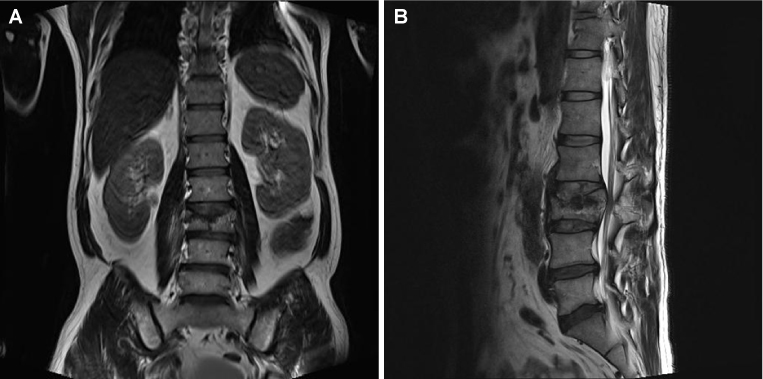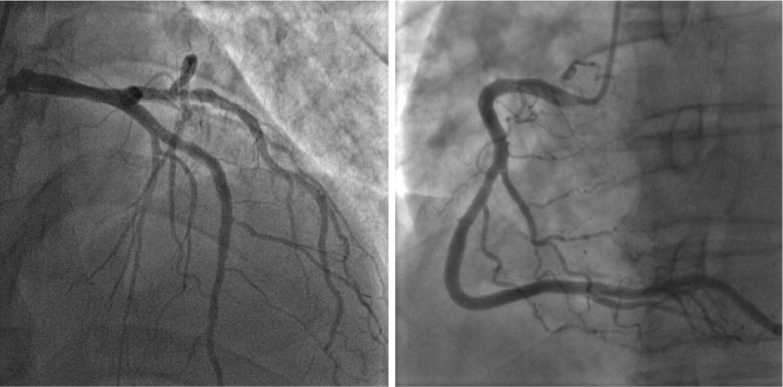J Lipid Atheroscler.
2016 Dec;5(2):163-167. 10.12997/jla.2016.5.2.163.
Major Trauma induced Left Ventricular Thrombus after Acute Myocardial Infarction
- Affiliations
-
- 1Department of Internal Medicine, Busan Medical Center, Busan, Korea. yoplait83@hanmail.net
- KMID: 2366141
- DOI: http://doi.org/10.12997/jla.2016.5.2.163
Abstract
- Left Ventricular Thrombus (LVT) formation after acute myocardial infarction is a serious complication. And the most feared complication of LVT is the systemic thromboembolic events, especially to the brain. Nowadays patients with acute myocardial infarction are treated with primary PCI and more aggressive anticoagulation therapies, resulting in the lower incidence of LVT. Early detection of LVT is very important, and echocardiography is the definitive test for detecting intracardiac thrombus. However, the need for serial echocardiography remains controversial. In this case report, we describe a 55-year-old man with major trauma induced LVT after acute myocardial infarction who underwent successful therapy.
Figure
Reference
-
1. Lee HJ, Kim HL, Hwang D, Park CS, Lim JS, Kang E, et al. Huge left ventricular thrombus and apical ballooning associated with recurrent massive strokes in a septic shock patient. Korean J Crit Care Med. 2016; 31:39–43.
Article2. de Gregorio C. Cardioembolic outcomes in stress-related cardiomyopathy complicated by ventricular thrombus: a systematic review of 26 clinical studies. Int J Cardiol. 2010; 141:11–17.
Article3. Cheitlin MD, Armstrong WF, Aurigemma GP, Beller GA, Bierman FZ, Davis JL, et al. ACC/AHA/ASE 2003 guideline update for the clinical application of echocardiography: summary article: a report of the American College of Cardiology/American Heart Association Task Force on Practice Guidelines (ACC/AHA/ASE Committee to Update the 1997 Guidelines for the Clinical Application of Echocardiography). Circulation. 2003; 108:1146–1162.
Article4. Keren A, Goldberg S, Gottlieb S, Klein J, Schuger C, Medina A, et al. Natural history of left ventricular thrombi: their appearance and resolution in the posthospitalization period of acute myocardial infarction. J Am Coll Cardiol. 1990; 15:790–800.
Article5. Porter A, Kandalker H, Iakobishvili Z, Sagie A, Imbar S, Battler A, et al. Left ventricular mural thrombus after anterior ST-segment-elevation acute myocardial infarction in the era of aggressive reperfusion therapy--still a frequent complication. Coron Artery Dis. 2005; 16:275–279.
Article6. Delewi R, Zijlstra F, Piek JJ. Left ventricular thrombus formation after acute myocardial infarction. Heart. 2012; 98:1743–1749.
Article7. Weinsaft JW, Kim HW, Crowley AL, Klem I, Shenoy C, Van Assche L, et al. LV thrombus detection by routine echocardiography: insights into performance characteristics using delayed enhancement CMR. JACC Cardiovasc Imaging. 2011; 4:702–712.8. Srichai MB, Junor C, Rodriguez LL, Stillman AE, Grimm RA, Lieber ML, et al. Clinical, imaging, and pathological characteristics of left ventricular thrombus: a comparison of contrast-enhanced magnetic resonance imaging, transthoracic echocardiography, and transesophageal echocardiography with surgical or pathological validation. Am Heart J. 2006; 152:75–84.
Article9. Barbera S, Hillis LD. Echocardiographic recognition of left ventricular mural thrombus. Echocardiography. 1999; 16:289–295.
Article10. Hirsh J, Fuster V, Ansell J, Halperin JL. American Heart Association. American College of Cardiology Foundation. American Heart Association/American College of Cardiology Foundation guide to warfarin therapy. Circulation. 2003; 107:1692–1711.
Article11. Meurin P, Tabet JY, Renaud N, Weber H, Grosdemouge A, Bourmayan C, et al. Treatment of left ventricular thrombi with a low molecular weight heparin. Int J Cardiol. 2005; 98:319–323.
Article12. Gando S. Disseminated intravascular coagulation in trauma patients. Semin Thromb Hemost. 2001; 27:585–592.
Article13. Kim JH, Kang TS. A case of distal embolization of left ventricular thrombus due to blunt chest trauma-induced coronary artery occlusion. Korean Circ J. 2011; 41:486–489.
Article14. Selby R, Geerts W, Ofosu FA, Craven S, Dewar L, Phillips A, et al. Hypercoagulability after trauma: hemostatic changes and relationship to venous thromboembolism. Thromb Res. 2009; 124:281–287.
Article
- Full Text Links
- Actions
-
Cited
- CITED
-
- Close
- Share
- Similar articles
-
- Incidence of Left Ventricular Thrombus after Acute Myocardial Infarction
- Surgical Removal of a Pedunculated Left Ventricular thrombus
- A Case of Distal Embolization of Left Ventricular Thrombus due to Blunt Chest Trauma-Induced Coronary Artery Occlusion
- Thrombolytic Therapy in the 8 Cases of left Ventricular Thrombus after Transmural Anterior Myocardial Infarction
- Surgical removal of a left ventricular thrombus caused by acute myocarditis




